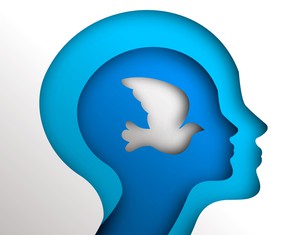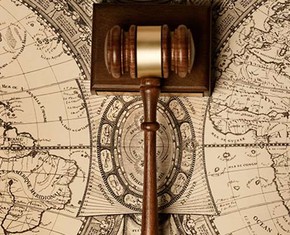The views expressed in our content reflect individual perspectives and do not represent the authoritative views of the Baha'i Faith.
Today, December 10, marks International Human Rights Day, when the entire world honors, recognizes, and celebrates the innate and inherent rights of all people.
Why December 10? On this day in 1948, the United Nations released The Universal Declaration of Human Rights. This short declaration, containing a brief preamble and 30 articles, has become one of the charter documents of an emerging global civilization.
RELATED: Uncovering the Root Cause of Human Rights Violations
After the preface, the UDHR begins like this:
THE GENERAL ASSEMBLY proclaims THIS UNIVERSAL DECLARATION OF HUMAN RIGHTS as a common standard of achievement for all peoples and all nations, to the end that every individual and every organ of society, keeping this Declaration constantly in mind, shall strive by teaching and education to promote respect for these rights and freedoms …
The world recognizes this signal milestone in human civilization because no global body; no nation; no culture; and no society had ever done anything like it before.
However, the Baha’i teachings have long proclaimed those fundamental human rights, beginning at the dawn of Baha’u’llah’s mission in the mid-19th century:
Baha’u’llah taught that an equal standard of human rights must be recognized and adopted. In the estimation of God all men are equal; there is no distinction or preferment for any soul in the dominion of His justice and equity.
Abdu’l-Baha, the son and successor of Baha’u’llah, made this statement in a speech he gave in Philadelphia in June of 1912, 36 years before the adoption of the UDHR.
In the UDHR, written by the representatives of many countries after history’s worst war, the United Nations proclaimed a “common standard of achievement for all peoples and nations,” declaring that each human being has inalienable rights and freedoms:
Article 1: All human beings are born free and equal in dignity and rights. They are endowed with reason and conscience and should act towards one another in a spirit of brotherhood.
Before this universal declaration, the limited rights and freedoms of human beings came, often by fiat, from repressive governments, kingdoms and fiefdoms, religious authorities, colonizing countries, or the rule of force. Some still do. But the UDHR altered that reality—since 1948, the majority of our globe’s governments have recognized the inherent rights and freedoms of their citizens, and the world has witnessed a rising tide of electoral democracies based on the noble concept of human freedom and human rights.
Of course, not all governments have reached that point. We still have a long way to go, especially in fragile states and the remaining despotic countries that continue to run roughshod over the human rights of their peoples. But now, with the UDHR setting a worldwide standard for rights and freedom, the human race has begun to move inevitably toward its visionary standard.
How did all of this happen?
The initial ideas arose from religion, as they often do. The Baha’i teachings, as just one example, urged all people to have regard for the rights of others. Progressive social reformers gradually incorporated those moral and spiritual imperatives into their work. A few of the world’s governments attempted to implement them, too, with varying degrees of commitment and success.
Then the unprecedented horrors and genocide perpetrated by both World Wars in the first half of the 20th century prompted the world’s leaders to act. When the Nazi atrocities came fully to light after WWII ended, the world community—still a new concept at the time—formed a consensus: never again! To implement that ideal, those leaders realized that the world’s people needed a codified set of rights that no government could rightfully or legally violate.
In 1947, the year before the United Nations adopted and codified the Universal Declaration of Human Rights, many individuals, groups and international organizations worked on and contributed to the document, making recommendations for its composition. This remarkable process, led by the UN’s Commission on Human Rights (CHR) and chaired by Eleanor Roosevelt, represented a unique departure in collective human affairs, because it brought together in joint consultation people from many parts of the world.
The Baha’i International Community, headquartered in New York, made its contribution to those important discussions, called A Baha’i Declaration Of Human Obligations And Rights—and then presented it to the first session of the CHR, held at Lake Success, New York in February of 1947. The Baha’i Declaration began this way:
The source of human rights is the endowment of qualities, virtues and powers which God has bestowed upon mankind without discrimination of sex, race, creed or nation. To fulfill the possibilities of this divine endowment is the purpose of human existence.
Human rights can be established in terms of social status when members of the community realize that the gift of life and conscious being obligates them to meet responsibilities owed to God, to society and to self. Mutual recognition by members of the community of the truth that their lives emanate from one and the same universal Source enables them to maintain ordered relationships in a common social body.
If you compare the two documents, you’ll see that much of the substance and wording of the Baha’i declaration found its way into the UDHR.
Then, as the two-year process moved forward to complete the UDHR, the Baha’i International Community diligently worked for its adoption around the world. Baha’is in various countries urged their governments to consult on, recognize, and ratify the UDHR. After the Declaration’s successful adoption on December 10, 1948, the world’s Baha’is advanced a campaign to recognize the Declaration and help educate the world about it.
That campaign, called “Human Rights Are God-Given Rights,” took root in the United States first, but soon spread around the world, making the global Baha’i community the earliest religious organization to advocate for worldwide protection of the human rights of all people.
RELATED: Standing for the Human Rights of All—Including Women
This prominent paragraph from the 1947 Baha’i statement seems especially powerful and prescient today:
The true destiny of the national state is to build the bridge from local autonomy to world unity. It can preserve its moral heritage and function only as it contributes to the establishment of a sovereign world. Both state and people are needed to serve as the strong pillar supporting the new institutions reflecting the full and final expression of human relationships in an ordered society. In delaying to fulfill the historic mandate given the peoples and nations of our age to unite, we give opportunity and encouragement to subversive forces whose weapon is confusion and whose aim is chaos.
So today, whatever you’re doing, stop for a moment and recognize, as Baha’u’llah clearly promised in his writings, that we all have equal rights—and that we’re all one:
O contending peoples and kindreds of the earth! Set your faces towards unity, and let the radiance of its light shine upon you. Gather ye together, and for the sake of God resolve to root out whatever is the source of contention amongst you. Then will the effulgence of the world’s great Luminary envelop the whole earth, and its inhabitants become the citizens of one city, and the occupants of one and the same throne.
















Comments
Sign in or create an account
Continue with Googleor